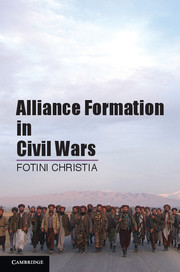Book contents
- Frontmatter
- Contents
- Figures
- Tables
- Maps
- Acknowledgments
- Introduction
- PART I CONTEXT AND THEORY
- PART II AFGHANISTAN
- 3 The Afghan Intra-Mujahedin War, 1992–1998
- 4 The Afghan Communist-Mujahedin War, 1978–1989
- 5 The Theory at the Commander Level in Afghanistan, 1978–1998
- PART III BOSNIA AND HERZEGOVINA
- PART IV FURTHER EXTENSIONS
- Note on Sources
- Appendix
- References
- Index
- References
4 - The Afghan Communist-Mujahedin War, 1978–1989
Published online by Cambridge University Press: 05 December 2012
- Frontmatter
- Contents
- Figures
- Tables
- Maps
- Acknowledgments
- Introduction
- PART I CONTEXT AND THEORY
- PART II AFGHANISTAN
- 3 The Afghan Intra-Mujahedin War, 1992–1998
- 4 The Afghan Communist-Mujahedin War, 1978–1989
- 5 The Theory at the Commander Level in Afghanistan, 1978–1998
- PART III BOSNIA AND HERZEGOVINA
- PART IV FURTHER EXTENSIONS
- Note on Sources
- Appendix
- References
- Index
- References
Summary
So far we have witnessed the unraveling of the civil war among Afghan mujahedin factions and the dramatic rise of the Taliban. That war – which started with the collapse of the Afghan communist regime in 1992 and ended with the Taliban's takeover of 90 percent of the country in 1998 – was fought along more or less perfectly overlain lines of ethnicity and party, which had been drawn just prior to the war's outbreak. Hence one might rightly wonder how these parties, which had appeared in much more ethnically integrated versions in the days of the Afghan Jihad (1978–1989), made partners and enemies in that earlier iteration of civil war on Afghan soil. Were those alliances also power-determined? Could alliance changes be accurately traced around relative power changes? Were there instances of group fractionalization during the Afghan Jihad and were they prompted by severe or asymmetrically borne losses among a group's constituent subgroups?
One might argue that the civil war in Afghanistan (1978–1989) that was cast in communist-versus-mujahedin terms is an easy first test of this book's theory. Given that it was fought along largely ideological rather than ethnic lines, one would not be surprised to see less salience placed on shared ideological characteristics. After all, they are not as ascriptive as ethnic characteristics, and we can see why a group may be less constrained by them. The existing literature, however, has no conclusive predictions on the matter. Scholars cannot even agree on whether the ethnic/nonethnic distinction is analytically meaningful. Indeed, most civil wars have gone down in history with a label: Those dating from the start of the twentieth century to the end of the Cold War tend to be coined as “ideological,” whereas those in the post–Cold War era are seen as “ethnic.” And even though no unique and systematic characterization appears to exist – some scholars make a new-versus-old civil wars distinction, whereas others a distinction between ethnic-versus-nonethnic civil wars – such identifiers are nevertheless often employed as heuristic descriptors.
- Type
- Chapter
- Information
- Alliance Formation in Civil Wars , pp. 101 - 125Publisher: Cambridge University PressPrint publication year: 2012



